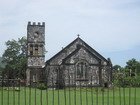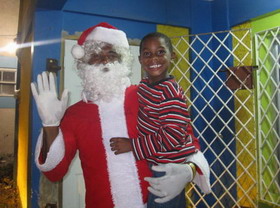Jamaican Music
Much More Than Reggae
When I think about Jamaican music, I have to wonder how it is our little island hasn't exploded yet. So much music and vibes in one small place surely must cause some sort of cosmic disturbance!
For some people, Jamaican music equals reggae equals Marley, and that's where it stops. For an earlier generation, the music of Jamaica was "Island in the Sun", and Harry Belafonte, and that's all they knew. But not you, not after you spend a little time here. I hope to take you on an exploration of our music, outlining its development, and allowing you to listen to how it has grown and changed over time. Should be fun.
Here's a taste of traditional mento music, played by the Lititz Mento Band of St. Elizabeth. The late great T. Miller is on violin. A brief commentary is provided by the Hon. Louise Bennett Coverley, Miss Lou.
Where did our music start? I imagine with the first known inhabitants of the island, the Tainos. We don't know what their music sounded like, but I wouldn't be surprised if there are traces of it lingering around, mixed in with the music of the Maroons.
The backbone of Jamaican music grew during and just after the days of slavery. African rhythms and tunes intermingled with European melodies and harmonies to produce the music of the traditional folk forms. Some of them are still practised today. Many make use of traditional Jamaican instruments, especially the Jamaican drum.
Bruckins, Jonkunnu, Dinki-mini, Gerreh, Quadrille, Work Songs and Ring Games are secular. Kumina and Revival (which includes Zion and Pukkumina) are religious. Each has its special melodies, rhythm, lyrics and dances.
Mento is a catch-all term which is broadly used to describe much of our traditional secular music. Our great Jamaican authority on folk music,
Dr. Olive Lewin, describes mento as "Jamaica's indigenous dance, song and instrumental style". It is the music to which most of our folk songs are set. Mento bands were particularly active in the country parts. Mento was popular from late in the 1800's to the early 1960's, when the advent of sound systems brought drastic changes to the music of Jamaica.
After World War II, while the countryside was being entertained by mento bands, middle and upper class Kingston was enjoying live big band music. Then in the early 1950's Jamaicans were introduced to American Rhythm and Blues by Radio Jamaica, the first radio station on the island. Radios, record players and records became popular, with a resulting decline in the demand for live bands to provide entertainment.
By late in that decade, people in dancehalls all over the island wanted to hear the latest R&B records. In response to this, huge portable sound systems (called 'sets' or 'sounds') were put together, and were trucked to different parts of Jamaica as needed. Local singers and musicians began to record R&B style music, in what was the beginning of the Jamaican music recording industry.
Jamaican Music - the beginnings of our own popular sound
A Jamaican-ness began to seep into the music that was being created by studio musicians. Elements of mento, of the afterbeat handclapping of Revival music, of the distinctive Rastafarian drumming that was emerging - all these elements swirled together with swing, bepop and R&B to produce a unique new sound. It was a fast, energetic music called Ska and it happened in the lead-up to Jamaica's independence in 1962.
In the mid 1960's, the frenzied beat of ska began to slow down. The much slower Rock Steady music began to provide social commentary, as had been done in a more comical style in mento. The bassline was delivered in shorter groups of notes than was the case in ska's boogie-type bass. The exuberance of independence was beginning to wear off, and Jamaican music reflected it.
Rock Steady was short-lived, and by about 1968, gave way to the faster tempo of what became known worldwide as Reggae. Just as the word Mento has become a label for our traditional music, the word Reggae has come to embody all Jamaican popular music since the 1960's.
During this early period of reggae music, the dub plate and the art of deejaying were born in the dancehall.
In the early 1970's reggae became slower, a vehicle for expressing the views of the ghetto, of voicing sentiments of Rastafari and Black Power. "Roots" or "Conscious" reggae was the result.
The influence of Rastafari on reggae was and continues to be immense. From artistes like Bob Marley and the Wailers and Burning Spear in the late sixties and early seventies, Rastafari has in varying levels had a hand in charting the course of reggae music.
The international spotlight hit reggae early in the 1970's with the signing of Bob Marley to Island Records, and the release of the movie
"The Harder They Come" and its soundtrack.
Jamaican music never stopped evolving and branching out. "Rockers" music was a style that came about in the mid seventies.
Listen to Gregory Isaacs' "Soon Forward", Jamaican music from 1979.
By the end of that decade, the deejays had reached new levels of accomplishment, and their output of music became labelled as "Dancehall" music.
Bob Marley died in 1981, and for the rest of the 1980's and well into the 1990's, the production of dancehall music far outstripped that of roots reggae.
This was fuelled by the increasingly computerised nature of the "riddims" (background music, primarily drum and bass) that were produced by studios which were growing in technological capabilty. The same riddim could be used over and over by different deejays for different songs.
The beat of dancehall music 123-123-12 (you'll get the beat if say it fast over and over, and clap when you say the number 1) was based on mento, with a harder edge to it provided by the drum and the bass. The lyrics were sometimes blatantly sexual, which gained it criticism in some circles.
Some thought that this period was the death of conscious reggae, but happily they have been proven wrong. Singers Dennis Brown, Gregory Isaacs, and Beres Hammond kept singing Lovers Rock and conscious reggae songs on the "one drop" rhythm of original reggae, as well as on the newer rhythms of the eighties and nineties. Beres has kept on making music right up to the present time.
Dancehall music now coexists with a thriving community of roots
reggae artistes and music. There has been a lot of controversy about explicit sexuality and violence in dancehall lyrics, with many songs (even some Marley songs) being banned from the radiowaves. Ironically, more local gospel acts are delivering songs in dancehall style.
I suspect that the controversy will only result in more Jamaican music being made, which will only make the world a lot more interesting.
Here's one of reggae music's biggest forces to be reckoned with, Chronixx, singing "Here Comes Trouble".
Check out dancehallreggaeworld for the latest dancehall music trends and info.
Return from Jamaican Music to Real Jamaica Vacations
Explore Jamaican Language
Latest talk on the streets - da page ya sell off, memba mi tell yu!
Words in everyday use - macca, foot bottom, ginnal
Unique phrases that are extremely expressive - pop story gi mi!
Sayings that have lived for generations - play wid puppy...









